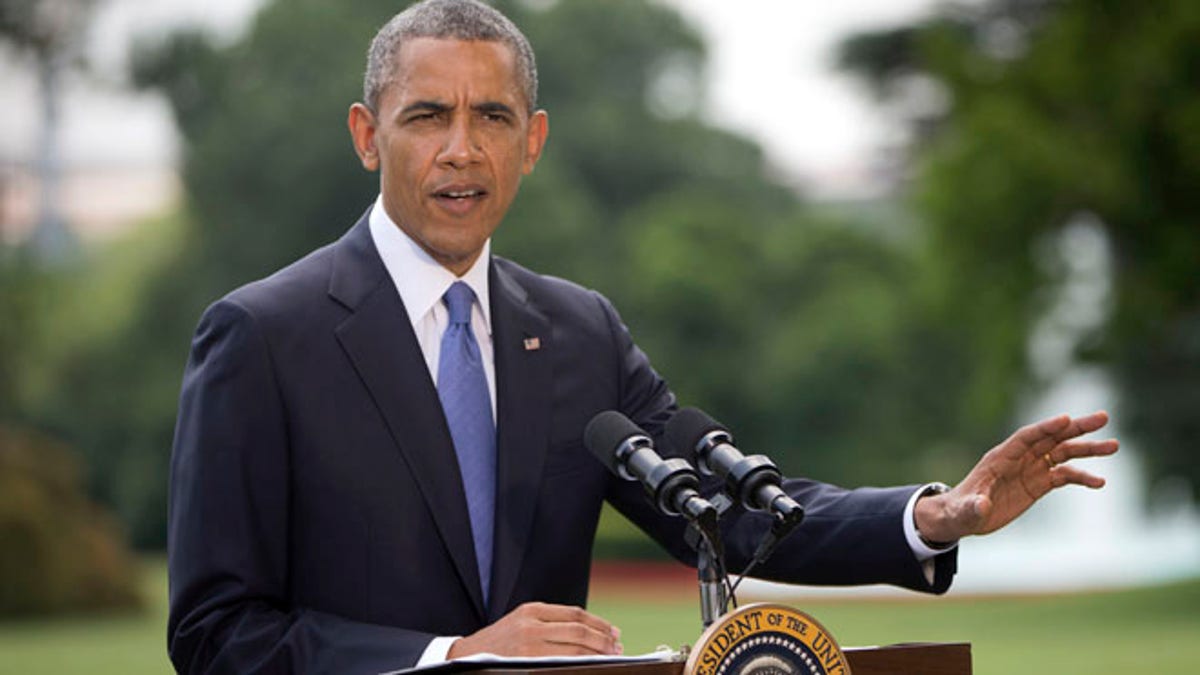
President Barack Obama talks about his administration's response to a growing insurgency foothold in Iraq, Friday, June 13, 2014, on the South Lawn of the White House in Washington. (AP)
Journalists have been fuming for years over the administration’s failure to live up to President Obama’s promises of transparent government.
But it’s even worse than you thought.
The focus, naturally, has been on the White House, where reporters press for scraps of information in the briefing room and news photographers are sometimes barred from events, supplanted by official photogs whose work amounts to propaganda.
But it turns out the problem is even more insidious where the real day-to-day business of government gets done, in federal departments and agencies.
In an unusual alliance, a number of journalism organizations have banded together to denounce what they call “politically driven suppression of news and information about federal agencies.”
Those are strong words. Suppression of news sounds like something done in totalitarian regimes. But the Society of Professional Journalists, American Society of Newspaper Editors, the Poynter Institute and other media groups make that case in a letter to Obama.
The issue itself is not new, as the groups acknowledge. I have battled for access to knowledgeable staffers in every administration during the decades I’ve been in Washington. That’s how you find out whether programs are working and ferret out statistics and reports on who’s getting the contracts and where the money is going—the basic building blocks of aggressive reporting. But political appointees have increasingly tried to restrict the flow of information.
“Over the past two decades,” the groups write, “public agencies have increasingly prohibited staff from communicating with journalists unless they go through public affairs offices or through political appointees. This trend has been especially pronounced in the federal government. We consider these restrictions a form of censorship -- an attempt to control what the public is allowed to see and hear.”
Calling it censorship is a definite ratcheting up of the rhetoric—and a barometer of journalistic frustration.
White House spokesman Eric Schultz defended the administration’s record, telling me that it is “the first ever to release White House visitor records. For the first time in history, anyone visiting in our website can see the 4 million visitors to the White House. Over the past six years, federal agencies have gone to great efforts to make government more transparent and more accessible than ever, to provide people with information that they can use in their daily lives, and to solicit public participation in government decision-making and thus tap the expertise that resides outside of government.”
Schultz said the administration has reduced the backlog of Freedom of Information Act requests by 45 percent, despite a surge in applications, and that Obama pushed through Congress a 2012 law to strengthen protections for whistleblowers.
But the groups’ letter paints a very different picture. It says that “most federal agencies prohibit their employees from communicating with the press unless the bosses have public relations staffers sitting in on the conversations. Contact is often blocked completely. When public affairs officers speak, even about routine public matters, they often do so confidentially in spite of having the title ‘spokesperson.’ Reporters seeking interviews are expected to seek permission, often providing questions in advance. Delays can stretch for days, longer than most deadlines allow. Public affairs officers might send their own written responses of slick non-answers.”
I’m less concerned about officials speaking on background than about getting people with answers to speak at all. Slick non-answers won’t cut it.
And here’s the chilling part: the groups cite a survey finding that “40 percent of public affairs officers admitted they blocked certain reporters because they did not like what they wrote.”
That, if true, is pure retaliation—a way of punishing journalists who don’t write favorable stories. This isn’t a popularity contest. The PR folks don’t have to like reporters, but they’re paid by the taxpayers to provide information.
The groups cite a number of examples: The Centers for Medicare and Medicaid Services wouldn’t allow a New York Times reporter to talk to staff for a story on a massive change in medical coding for health care. A reporter with the online Investigative Post repeatedly unsuccessfully pressed the Environmental Protection Agency about its actions involving hazardous waste in Buffalo. A Reuters journalist could not get press office approval for an EPA scientist to discuss climate change before finally appealing to the agency’s chief of staff.
The letter urges Obama to encourage agencies to cooperate with reporters and to name an ombudsman to enforce such efforts.
Some people think journalists whine too much about access. But few stories are broken by talking to press officers. And the agencies have vast responsibilities when it comes to regulating banks, polluters, food safety, health care, immigration, transportation and on and on. When there’s a massive failure—a collapsed mine, a major oil spill, a massive General Motors recall—it often turns out that federal watchdogs were asleep at the switch.
The administration has already chilled investigative reporting by conducting surveillance of the likes of AP reporters and Fox News’ James Rosen, although the Justice Department has promised reforms when it comes to leak investigations.
But it’s in the trenches, away from the spotlight, that journalists are most often blocked from doing their jobs.












































